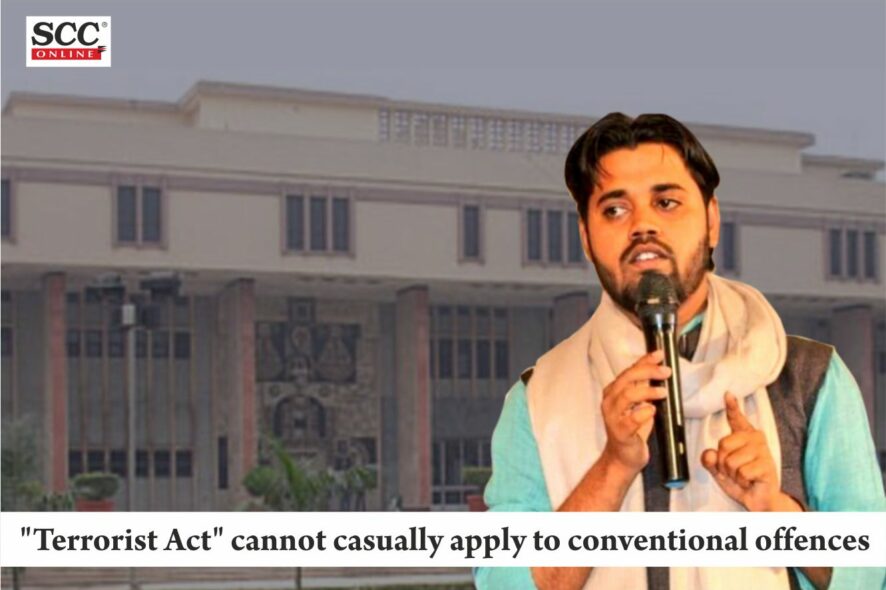Delhi High Court: The Division Bench of Siddharth Mridul and Anup Jairam Bhambhani, JJ., granted bail to Asif Iqbal, who was booked under provisions of the UAPA Act for his role in the Delhi Riots during the anti-CAA protest last year.
Asif Iqbal | Mastermind behind Delhi Riots?
Asif Iqbal Tanha, a 25-year old student filed the instant appeal under Section 21(4) of the National Investigation Agency Act, 2008 seeking bail as he was in judicial custody since 19-05-2020 under provisions of Penal Code, 1860, Prevention of Damage to Public Property Act, 1984 and Unlawful Activities (Prevention) Act, 1967.
Appellant was alleged to be one of the main conspirators as well as instigators behind the riots that occurred in North-East Delhi and played an active role in the conspiracy.
Section 15 of Unlawful Activities (Prevention) Act, 1967
The said section defines ‘terrorist act’ and Section 18 provides for ‘punishment for conspiracy for committing a terrorist act, including an attempt to commit or advocating, abetting, advising or inciting the commission of a terrorist act, as also of any act preparatory to the commission of a terrorist act’, the word ‘terrorism’ or ‘terror’ has nowhere been defined in the UAPA.
Right to Protest | Part of Fundamental Rights under Constitution of India
- Mazdoor Kisan Shakti Sangathan v. Union of India, (2018) 17 SCC 324:
“48. …Undoubtedly, holding peaceful demonstrations by the citizenry in order to air its grievances and to ensure that these grievances are heard in the relevant quarters, is its fundamental right.”
“…Question is not as to whether the issue raised by the protestors is right or wrong or it is justified or unjustified. The fundamental aspect is the right which is conferred upon the affected people in a democracy to voice their grievances. Dissenters may be in minority. They have a right to express their views.”
- Babulal Parate v. State of Maharashtra, AIR 1961 SC 884:
“31. The right of citizens to take out processions or to hold public meetings flows from the right in Article 19(1)(b) to assemble peaceably and without arms and the right to move anywhere in the territory of India.”
- Ramlila Maidan Incident, In re [(2012) 5 SCC 1], the Court observed that the right to assembly and peaceful agitations were basic features of a democratic system and the Government should encourage exercise of these rights
Bench noted that in the present matter, there was nothing to show that Government prohibited the protest.
‘Terrorist Act’ under Section 15 UAPA
The said phrase must partake of the essential character of terrorism and the phrase ‘terrorist act’ cannot be permitted to be casually applied to criminal acts or omission that fall squarely within the definition of conventional offences.
Where the court finds that an act or omission is adequately addressed and dealt with by the ordinary penal law of the land, the court must not countenance a State agency ‘crying wolf’.
State’s attempt to show accusation against appellant prima facie true: Fail. How?
- No allegation leading to appellant being the leader of all the co-conspirators.
- Appellant was stated to be a member of SIO and JCC, both are not banned organisation or terrorist organisations listed in First Schedule of UAPA.
- The anti-CAA protest did not extend to the whole of NCT of Delhi, therefore it would be a stretch to say that the protest affected the community at large for it to qualify as an act of terror.
- No arms, ammunition and other articles used as weapons were recovered from or at the instance of the appellant.
- Foundations of nation stand on surer footing that to be likely to be shaken by a protest, however vicious, organised by a tribe of college students or other persons, operating as a coordination committee from the confines of a University situate in the heart of Delhi.
- State’s submission based upon inferences drawn by the prosecuting agency and not upon factual allegations.
- Protest in which the appellant participated was neither banned nor outlawed and the same was monitored by law enforcement agencies.
High Court found absolutely nothing in the subject charge-sheet, by way of any specific or particularised allegation that would show the possible commission of a ‘terrorist act’ within the meaning of Section 15 UAPA; or an act of ‘raising funds’ to commit a terrorist act under Section 17; or an act of ‘conspiracy’ to commit or an ‘act preparatory’ to commit, a terrorist act within the meaning of Section 18 UAPA.
Bench opined that no offence under Sections 15, 17 or 18 UAPA was made-out against the appellant on a prima facie appreciation of the subject charge-sheet and the material collected and cited by the prosecution, the additional limitations and restrictions for grant of bail under Section 43D(5) UAPA do not apply.
With regard to outlining the consideration for bail, Court referred to the following significant decisions of the Supreme Court in:
- Ash Mohammad v. Shiv Raj Singh, (2012) 9 SCC 446
- Sanjay Chandra v. CBI, (2012) 1 SC 40
- Chidambaram v. CBI, (2020) 13 SCC 337
- Babu Singh v. State of U.P., (1978) 1 SCC 579
Therefore, applying the well-worn principles of bail, Court held that it is not prima facie convinced of the veracity of the allegations so made and hence granted regular bail subject to conditions.[Asif Iqbal Tanha v. State (NCT of Delhi), 2021 SCC OnLine Del 3253, decided on 15-06-2021]
Advocates before the Court:
For the Appellant: Mr. Siddharth Aggarwal, Advocate with Ms. Sowjhanya Shankaran, Mr. Siddharth Satija, Mr. Abhinav Sekhri & Ms. Nitika Khaitan, Advocates
For the Respondent: Mr. Aman Lekhi, ASG alongwith Mr. Amit Mahajan, Mr. Rajat Nair and Mr. Amit Prasad, SPPs with Mr. Ujjwal Sinha, Mr. Aniket Seth, Mr. Ritwiz Rishabh, Ms. Riya Krishnamurthy and Mr. Dhruv Pande, Advocates.
Sh. P. S. Kushwaha, DCP with Sh. Alok Kumar, Addl. DCP, Special Cell, Insp. Lokesh Kumar Sharma and Insp. Anil Kumar.


